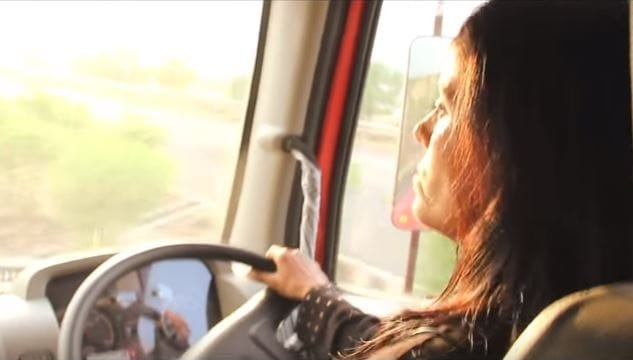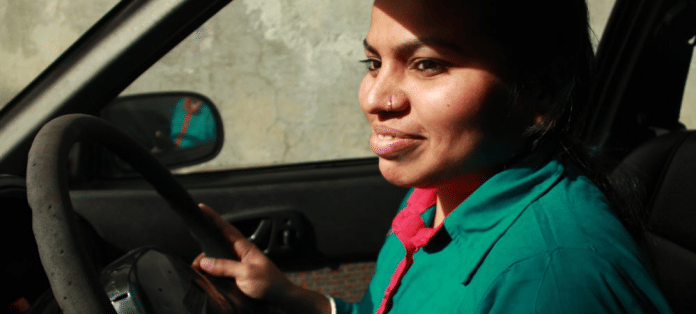A new government scheme wants more women driving commercial transport vehicles in rural India. A look back at the experiences of women behind the wheel in India suggests the road ahead may be bumpy.
In an attempt to improve public transportation in rural areas, the Central government has decided to rope in women self-help groups to operate mini-buses which have a capacity of 10-12 passengers. The scheme that is part of the Pradhan Mantri Gramin Parivahan Yojna is a unique initiative considering India has few professional women drivers and that too mostly in urban pockets.
In fact, the experiences of many women who have attempted to become commercial drivers might serve as a lesson for what needs to be done to ensure that such initiatives succeed in inspiring women to take to the profession and then keeping them gainfully employed.
The problems women drivers face
Compared to other means of transport, many women have been employed as taxi drivers in Indian cities. They have mostly been hired by cab services focused on women’s transport, many of which have failed or are loss-making.
Angel City Cabs, a Bangalore-based agency trained over 50 women to be professional taxi drivers, but presently doesn’t have even one employed with them.
“Women leave the job frequently due to lack of familiarity with the city roads and family support,” Surya Mukundaraj, co-founder of Angel City Cabs, told ThePrint in a telephonic interview.
“Some women are single breadwinners in their family, due to which they also have to finish household chores before leaving for work; the double burden of domestic and paid work also takes a toll,” Radhika Uppal, from the Azad Foundation, a Delhi-based NGO which trains women drivers, said.

A woman driver, who has been working with Delhi-based taxi service Sakha Consulting Wings, spoke of how much pressure she faced.
“People don’t like it that women are driving taxis. When I started out no one from my family supported me; I had to hide the fact that I had started working,” Geeta said.
Another problem is customer awareness. Sophia Akoijam, the chief operating officer of Sakha Consulting Wings, said they have often faced questions like, “How can we be safe with a woman?”
There are other problems as well. Rajeshwari C, a former driver with Angel City Cabs, had to quit after being unable to get a driving licence. She was denied a licence because she didn’t have a class 10 mark sheet.
Even the railways hasn’t made much progress when it comes to having women train operators. Since Surekha Yadav became India’s first female train driver in 1988 there have been many others who joined. But given the job requires physical strength, qualifications and high medical standards, it remains a male-dominated field.
In the nation’s capital, the Delhi Metro presently employs 104 women station controllers and train operators, as compared to just three in 2002. A Delhi Metro spokesperson said that their hiring process was not gender-specific. Women train operators are given benefits like getting postings near their homes and are exempt from late night and early morning duties. But women still constitute only 7.4 per cent of the total number of controllers and operators.
When it comes to state-run bus services, the presence of women drivers is even lower. The Maharastra State Road Transport (MSRTC) Corporation had reserved 30 per cent of its posts for women in 2012, but failed to find a single female driver for its buses. But MSRTC is undeterred and has announced that it will be hiring 450 women drivers.
The national capital’s bus service in 2015 sought applications from women drivers as part of a campaign to battle harassment against women and Vankadarth Saritha was hired as Delhi’s first woman bus driver. However, she quit this year and is reportedly seeking a job in Telangana. Sanjay Saxena, a spokesperson for the Delhi Transport Corporation, said most women applicants possibly stayed away from the job due its requirements and not wanting deal with the public.
It isn’t much better in other modes of public transport. In Maharashtra, the government reserved 5 per cent of auto-rickshaw licences for women and 19 were handed out in March. But many of the women drivers have since reportedly complained of harassment by their male counterparts.
Women in commercial trucking are also few. Many ventured into the industry seeking financial independence, but have complained of harassment by others.
The road ahead
People in the industry say that if the government is serious about more women becoming professional drivers, there are two things that need to be addressed quickly: the lack of toilets and government support.
“We have been asking the government for clean washrooms to be built every 5 kms,” Akoijam, from cab company Sakha Consulting Wings, said.
She emphasised the need for a separate channel for women when they seek commercial licences, at least until there are more women in the industry. Co-founder of Angel City Cabs Mukundaraj believes the Regional Transport Authority rules for women drivers should be relaxed, given acquiring a yellow board badge requires a year’s experience.






